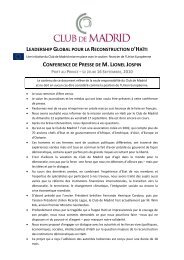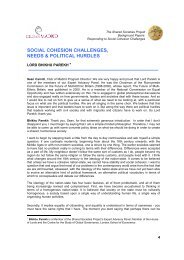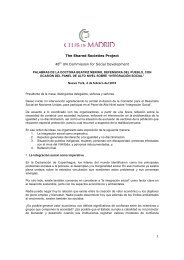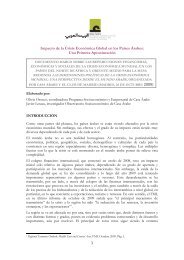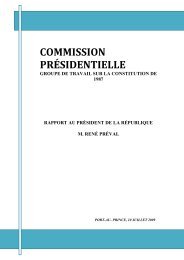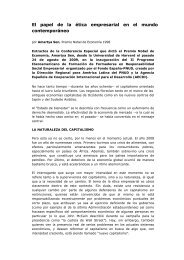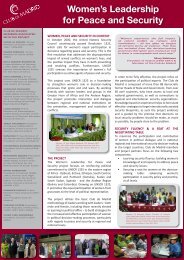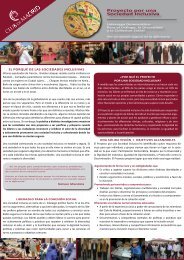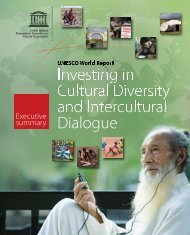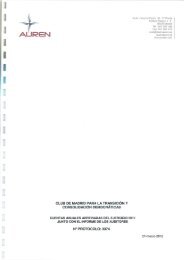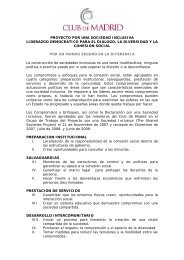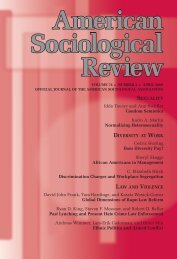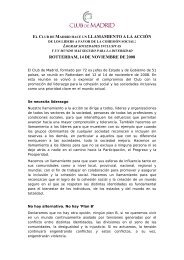CLUB DE MADRID: REPORT OF ACTIVITIES <strong>2007</strong>met with various groups <strong>of</strong> State delegates and civil society representatives, including the PrimeMinister, former members <strong>of</strong> parliament, representatives <strong>of</strong> human rights associations, themedia, trade unions, lawyers, activists and politicians. Meetings focused on freedom <strong>of</strong>association and the electoral system, the media, future parliamentary elections and freedom <strong>of</strong>association in the legislative framework. The subjects covered during this mission included theelectoral law and laws regarding political parties, public meetings and Non-GovernmentalOrganisations.Missions to BahrainSubsequent to the missions carried out by the <strong>Club</strong> <strong>of</strong> <strong>Madrid</strong> to Morocco in March and Jordanin April, the organisation sent a mission to the Kingdom <strong>of</strong> Bahrain in April focusing onfreedom <strong>of</strong> association. It was led by the <strong>Club</strong> <strong>of</strong> <strong>Madrid</strong> Members Sadig Al Mahdi (Sudan),Zlatko Lagumdzija (Bosnia and Herzegovina) and Cassam Uteem (Republic <strong>of</strong> Mauritius).With the support <strong>of</strong> the Bahrain Centre for National Studies, the project associate, thedelegation met with members <strong>of</strong> the Bahrain government, parliament and civil society,including S.E. Sheikh Khalid Bin Ahmed Al Khalifa, Minister <strong>of</strong> Foreign Affairs, members <strong>of</strong>both chambers in the parliament, representatives <strong>of</strong> ten political parties, eleven civil societyorganisations, including pr<strong>of</strong>essional associations, human rights and women’s organisations andrepresentatives <strong>of</strong> several media.The <strong>Club</strong> <strong>of</strong> <strong>Madrid</strong>’s work in this project was carried out in collaboration with leadersinvolved in the processes <strong>of</strong> dialogue in Jordan, Bahrain and Morocco who, in a subsequentphase <strong>of</strong> the project, will share this experience with other countries in the region, such as Egypt,Saudi Arabia and Tunisia. This mission marked the start <strong>of</strong> a learning process on the progressachieved by the Bahrain people regarding democratic reform and the identification <strong>of</strong>challenges still remaining and how they can be met.At the end <strong>of</strong> October, the <strong>Club</strong> <strong>of</strong> <strong>Madrid</strong> carried out a second mission to the Kingdom <strong>of</strong>Bahrain, with the participation <strong>of</strong> the Members Sadig Al Mahdi (Sudan) and Valdis Birkavs(Latvia). The <strong>Club</strong> <strong>of</strong> <strong>Madrid</strong> took part in meetings with State and civil society representativeson the subject <strong>of</strong> freedom <strong>of</strong> association and participation in public affairs. Amongst thepartners with which the <strong>Club</strong> <strong>of</strong> <strong>Madrid</strong> worked in Bahrain were Mr Jamal Fakhro, First Vice-President, Shura Council; Dr Abdulaziz Abul, Member <strong>of</strong> Parliament; and Mr Adbulnay Alekry<strong>of</strong> the Bahrain Human Rights Society.Meeting on democratic values in the Arab World in Cordoba, SpainIn mid-May, the <strong>Club</strong> <strong>of</strong> <strong>Madrid</strong> organised a meeting in Cordoba, Spain, on democratic valuesand freedom <strong>of</strong> association in the Arab World, as part <strong>of</strong> the project receiving support from theEuropean Commission and the United Nations Fund for Democracy. The meeting leaders wereby the <strong>Club</strong> <strong>of</strong> <strong>Madrid</strong> Members Abdul-Kareem Al-Eryani (Yemen) and Sadig Al Mahdi(Sudan). The meeting, held with the support <strong>of</strong> Rosa Aguilar, Mayor <strong>of</strong> Cordoba, was openedby Miguel Ángel Moratinos, Spanish Minister <strong>of</strong> Foreign Affairs, and participants includedsenior <strong>of</strong>ficials from Bahrain, Jordan and Morocco.Members <strong>of</strong> the <strong>Club</strong> <strong>of</strong> <strong>Madrid</strong> and representatives <strong>of</strong> the government, parliament and civilsociety <strong>of</strong> these three countries centred their discussions on the subject <strong>of</strong> freedom <strong>of</strong>association as a key element in democratic practice. The meeting, which received the support <strong>of</strong>the Casa Árabe - International Institute <strong>of</strong> Arab and Moslem World Studies, aimed to fosterdebate on strategies for building consensus amongst state and non-governmental agents in a6/17
CLUB DE MADRID: REPORT OF ACTIVITIES <strong>2007</strong>region that is characterised by diversity and high levels <strong>of</strong> political controversy.SHARED SOCIETIES PROJECT, component: “Democratic Dialogue and Freedom <strong>of</strong>Association in the Arab World: Study trip by Saudi Arabian municipal counsellors aspart <strong>of</strong> the activity “Sharing experience <strong>of</strong> democratic local government in Spain”Twenty elected municipal counsellors from Saudi Arabia took part in a study trip to Spain inthe month <strong>of</strong> July to learn about the democratic experience <strong>of</strong> Spain at municipal level. Thisinitiative by the <strong>Club</strong> <strong>of</strong> <strong>Madrid</strong> and the National Democratic Institute included a seminarproviding an overview <strong>of</strong> the Spanish political system and a strategic workshop on municipalmanagement. Both these activities were held in <strong>Madrid</strong> with the support <strong>of</strong> the SpanishFederation <strong>of</strong> Municipalities and Provinces.During their stay in the Spanish capital, the City Council <strong>of</strong> <strong>Madrid</strong>, thanks to the generalcoordinator <strong>of</strong> <strong>Madrid</strong> Globa , Mr Ignacio Niño, <strong>of</strong>fered a meal for the whole delegation in its<strong>Club</strong> de Campo headquarters.For one week, the Saudi counsellors travelled in two groups to the cities <strong>of</strong> Alcorcón,Barcelona, Córdoba (in collaboration with Casa Árabe), Granada and Zaragoza, where they metthe mayors and municipal counsellors and were able to analyse the exercise <strong>of</strong> democracy bythe municipal authorities, from both political and pr<strong>of</strong>essional viewpoints. The trip ended inBarcelona, where the delegation had the opportunity to learn about municipal and provincialinternational cooperation in meetings with United Cities and Local Governments and the CityCouncil <strong>of</strong> Barcelona.Some <strong>of</strong> the subjects arousing most interest among the Saudi counsellors were strategicplanning, the setting <strong>of</strong> priorities for municipal policies, involvement <strong>of</strong> the community andcommunity activities.SHARED SOCIETIES PROJECT, component: “WOMEN’S POLITICALPARTICIPATION AND LEADERSHIP: Underpinning and Developing DemocraticElectoral Processes through the empowerment <strong>of</strong> women Parliamentarians and Leadersin Sub-Saharan Africa”In February <strong>2007</strong>, the <strong>Club</strong> <strong>of</strong> <strong>Madrid</strong> set up the African Women Leaders Project (AWLP) withthe aim <strong>of</strong> providing high-level support for women leaders in Nigeria, Sierra Leone andUganda. This initiative, lasting 18 months and financed by the European Commission’sEuropean Initiative for Democracy and Human Rights and the Canadian government throughthe Canadian International Development Agency, will help strengthen women’s politicalleadership, and in the long term should promote public confidence in women leaders andincrease women’s political participation.The specific goals <strong>of</strong> this project are to provide political leaders with new resources tostrengthen their political leadership; to identify and share best practices at regional andinternational levels increasing women’s political participation, including gender quotas andpolicies for positive discrimination; to facilitate the exchange <strong>of</strong> experiences and dialogueamongst women parliamentarians in the three countries and other leaders from Africa and therest <strong>of</strong> the world, fostering the sharing <strong>of</strong> knowledge and resources; to promote greaterawareness <strong>of</strong> the obstacles to women’s political participation; to work towards egalitarianpolitical participation in order to ensure proper functioning <strong>of</strong> democracy; and to increasewomen’s political participation in these countries through relevant international strategies forsupport and through the identification and adoption <strong>of</strong> policies that work.7/17



